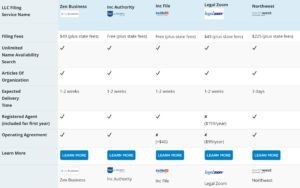Investors, couples and partnerships seek real estate investment opportunities as a supplemental or full-time income. These investors are increasingly turning to the LLC (Limited Liability Company) legal structure as a way to limit personal liability in relation to a real estate investment while maintaining a simple way to fulfill tax requirements.
Can an LLC buy a house in a turbulent real-estate market? Is it safe to hand over the ownership of your real-estate to an LLC that you control as a member?
The main purpose of the LLC is to utilize pass-through taxation and limited liability to protect personal assets. In the case of a lawsuit involving the real estate investment, assets such as a house, and personal bank account would not be liable for debt payment in the case of a settlement. An LLC limits personal risk and is easy to manage thanks to its simple membership structure and pass-through taxation.
In addition to its use as a home-buying entity, the LLC has become a popular business structure for entrepreneurs.
Can an LLC buy a house? The answer is yes. But as it is with any other financial decision, there are drawbacks and benefits to consider.
Take The Hassle Out Of Forming Your LLC. Compare The Best LLC Formation Services.
| Filing Fees | $49 + state fee | $49 + state fee | $49 + state fee | Free + state fee | $49 + state fee | $225 + state fee |
| Unlimited Name Availability Search | ✔ | ✔ | ✔ | ✔ | ✔ | ✔ |
| Articles Of Organization | ✔ | ✔ | ✔ | ✔ | ✔ | ✔ |
| Expected Delivery Time | 1-2 weeks | 24-hour processing, Free Express Shipping | 1-2 weeks | 1-2 weeks | Within 1 week | 3 days |
| Registered Agent (included for first year) | ✔ | ✔ | ✘ ($159/year) | ✔ | ✘ ($149/year) | ✔ |
| Operating Agreement | ✔ | ✘ | ✘ ($99/year) | ✔ | ✘ (+$35) | ✔ |
LLC for Real Estate Ownership
A Limited Liability Company is a separate entity. Even though taxation statutes levy taxes on personal incomes of the member or members of the LLC, it is still eligible to acquire assets and income under its name. This means that an LLC can buy a house.
The reasons for the purchase can be listed in the original Articles of Organization that each member signs. The articles of organization include the allowance for real estate ownership. Separation of business and personal finances, pass-through tax implications, and liability protection are some of the reasons for why an LLC is the preferred legal entity to use for buying real estate.
Funding
So, how can an LLC buy a house? Can my LLC get a mortgage under its own name?
One way investors circumvent this problem is by getting approved for a mortgage under their own name and then transferring the property to the LLC. Owners can either own the house as a rental property for some time or directly transfer the title.
The benefit of this route is that owners are still eligible to enjoy the limited liability advantage that LLCs offer. Even though the owners will be the ones responsible for the mortgage, their personal property and assets will still be protected in case of a lawsuit.
A single member or multiple members can lend the LLC money to purchase the house. In the case that the LLC is owned by multiple members, it is critical that the LLC’s funds are used for the purchase. This mitigates any confusion that may arise if the business is dissolved or is divided.
Husband and Wife LLC for Property Ownership
Spouses can create an LLC for property ownership.
They can create a partnership and own property under the LLC’s title and be taxed as such unless the couple elects to be taxed as a corporation. In order to do so, the husband and wife LLC should elect Qualified Joint Venture status when forming the LLC, as per IRS’ Revenue Procedure 2002-69.
If the husband and wife LLC is made in community property states, the law already assumes the property as part of joint ownership. These states currently (2020) include:
- Arizona
- California
- Idaho
- Louisiana
- Nevada
- New Mexico
- Texas
- Washington, and
- Wisconsin
In community property states, LLCs that are co-owned by husband and wife can be declared as an SMLLC (single-member LLC) for tax purposes.
This often means that the husband and wife don’t need to file separate tax returns but can file a joint return. This will make them eligible for general tax savings that become applicable to joint returns.
A couple must also include a Schedule C and relevant schedules (Schedule SE, Schedule E etc.) for the SMLLC. In order to obtain a Qualified Joint Venture status, the LLC must satisfy the following requirements:
- It must be formed in a community property state.
- The only owners of the LLC are the married couple.
- Spouses must make material contributions towards operating the business.
- The LLC must not be taxable as a Corporation under 26 CFR 301.7701-2.
Pros and Cons of Buying a House Under an LLC

An LLC can be used to own property. The LLC limits the liability that you may face as a property owner. You still have to meet obligations of the property as the LLC member.
Here are some pros and cons of buying a house under an LLC:
Pros
1. Personal Asset Protection
When owning any kind of rental property, you are exposing yourself to litigation. If you lose, you might end up having to pay damages.
Forming an LLC means that you’ll only be liable for as much as the LLC is worth and won’t have to risk your personal assets.
2. Tax Advantages
LLCs are presented with a choice on how to be taxed. You can choose to be taxed as a corporation, paying no taxes on rental income(subject to conditions). You can also choose to be taxed as a partnership and enjoy personal asset protection provided by an LLC.
3. Management Flexibility
When you structure your rental property business as an LLC, even if it is only for one property, you’re given flexibility with your company’s management structure. You can have all the members share in the daily decision-making for the business or you can designate a manager(s) that will make decisions for you, also known as a Manager-Managed LLC.
The manager-managed structure allows you to hire people who are familiar with the responsibilities without contracting the work to a local property management agency. Remember, in this structure, the managers do not have to be members of the LLC, meaning a stake in the LLC isn’t necessary for them to make decisions. Managers basically act as agents of the original members.
In most states, your LLC will be member-managed by default unless you state in your articles of organization that you intend to hire managers.
4. Contributing Assets to the Company
You can introduce personal capital into your LLC to buy real estate. This also includes personal loans that you’ll give to the LLC. You’re also allowed to charge reasonable interest to the LLC on the loan provided.
5. Fewer Annual Administrative Requirements
Forming an LLC to buy real estate will mean that there will be some annual paperwork requirements imposed on you by the governing jurisdiction, such as filing Form 1040-SR, Schedule C, W-2 forms, and more. However, these requirements aren’t even half as taxing as that of C- or S-corps. Large corporations must document shareholder meetings, offering minutes for license renewal etc.
6. Single-Member LLCs to Buy a House
Solo entrepreneurs can buy a house with a single-member LLC. These are easier to maintain, offering almost the same level of flexibility and pros and cons. However, we recommend opening a separate bank account for the single-member LLC, else you might not be able to enjoy the same level of personal asset protection.
Cons of Using an LLC to Buy a House
1. Can an LLC buy a house after raising Capital?
One of the main obstacles LLC members face when buying a house is securing a loan from a financial institution. They have some reservations approving loans and mortgages due to the limited liability of LLCs.
For instance, banks would have a harder time enforcing legal penalties for defaulting LLCs due to the limited liability clause. You will need to have a solid financial background for banks to approve loans. These loans can be guaranteed by other members as well. Unless you’re the guarantor, you won’t be liable to pay off the loan if the business fails to do so. Some banks might ask you to be the guarantor personally for that reason.
2. Limits to the Limited Liability
If your LLC is directly involved in a lawsuit regarding a house, a judge can rule against the protection provided by an LLC. This is most often the case when you fail to maintain separate business and personal books or have conducted business in a way that constitutes fraud. This is what we call “piercing the corporate veil” in the industry.
3. Self-Employment Tax for Pass-Through Income
By default, the tax structure for an LLC is similar to a partnership. This means that members working for the business must pay self-employment tax. In addition, LLC members are personally responsible for Medicare/Medicaid and Social Security withholdings that the employer usually has to pay.
4. Member Turnover Issues
The ‘continuity’ set forth by an LLC suggests that after you pass away, the house you purchased will be transferred to other partners. In case you’re the sole owner and something happens to you, your company might have to dissolve, leaving your family to deal with the LLCs debts and business accounts.
Spousal LLCs fare much better in this regard as the LLC won’t dissolve if one of the spouses passes away.
5. Tax Responsibilities
While the administrative issues aren’t as tough for LLCs as with unlimited liability (a company where members agree to pay all debts and obligations of the company without any limit) or public companies, the tax responsibilities are still higher than other business structures. Whether you choose to be taxed as S-corp, C-corp or partnership, you’ll have to file a separate tax return form for your LLC.
When filing annual taxes, you must use Form 1065 (K1 forms) to pass any income to yourself or to other owners. Depending on the state in which your LLC is registered, you might have to pay franchise or excise taxes, or both.
Final Words
Purchasing a house is a major investment, especially when doing it alone. Choosing the right business entity for ownership of your real estate investment portfolio can make all the difference in terms of liability protection.
An LLC might not be the easiest option out there but it definitely is easier than its counterparts – public companies, for example. In this light, the LLC is a cost-effective solution. Should things start going in the wrong direction, an LLC structure can help you protect your personal assets from most liabilities.

















